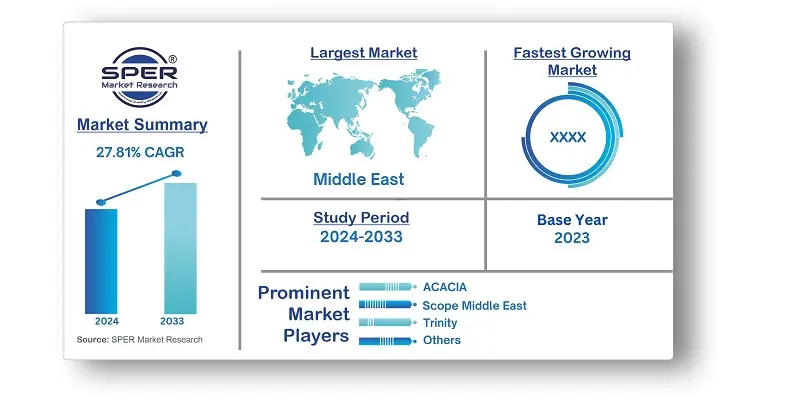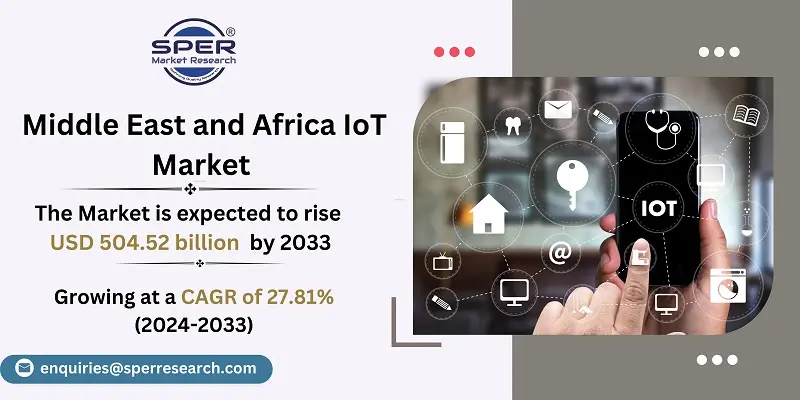
Middle East and Africa IoT Market Growth, Size, Trends, Share, Revenue, Scope and Future Outlook
Middle East and Africa IoT Market Size- By Component, By End User Industry- Regional Outlook, Competitive Strategies and Segment Forecast to 2033
| Published: May-2024 | Report ID: IACT24103 | Pages: 1 - 154 | Formats*: |
| Category : Information & Communications Technology | |||
- April 2021; The launch of Vodafone Idea's integrated IoT solution for the automotive industry was announced. The company's IoT portfolio was further strengthened with the launch of this product.
- April 2022; Arm Limited Unveiled Arm Cortex-M85 and Arm Cortex-A, two new solutions, in April 2022. The company will be able to provide customers with better solutions thanks to these new products and services, which will draw in new clients and quicken revenue growth.


| Report Metric | Details |
| Market size available for years | 2020-2033 |
| Base year considered | 2023 |
| Forecast period | 2024-2033 |
| Segments covered | By Component, By End-User Industry |
| Regions covered | Kingdom of Saudi Arabia, United Arab Emirates, Rest of Middle East & Africa |
| Companies Covered | ACACIA (UAE), Avnet (US), EPm AI Empowered Solutions (UAE), IOTPlus (UAE), iSAT Africa (Africa), iWire Global (UAE), Scope Middle East (UAE), Telit (US), Trinity (South Africa), Others |
- Industry Stakeholders
- Government Agencies and Policymakers
- Investors and Venture Capitalists
- Technology Providers and Solution Vendors
- Research and Academic Institutions
- Consulting Firms and Analysts
- Trade Associations and Chambers of Commerce
| By Component: |
|
| By End-use Industry: |
|
| By Region: |
|
- Middle East and Africa IoT Market Size (FY’2024-FY’2033)
- Overview of Middle East and Africa IoT Market
- Segmentation of Middle East and Africa IoT Market By Component (Platform, Solution & Service)
- Segmentation of Middle East and Africa IoT Market By End-User Industry (BFSI, Retail, Government, Healthcare, Manufacturing, Agriculture, Sustainable Energy, Transportation, IT & Telecom)
- Statistical Snap of Middle East and Africa IoT Market
- Expansion Analysis of Middle East and Africa IoT Market
- Problems and Obstacles in Middle East and Africa IoT Market
- Competitive Landscape in the Middle East and Africa IoT Market
- Impact of COVID-19 and Demonetization on Middle East and Africa IoT Market
- Details on Current Investment in Middle East and Africa IoT Market
- Competitive Analysis of Middle East and Africa IoT Market
- Prominent Players in the Middle East and Africa IoT Market
- SWOT Analysis of Middle East and Africa IoT Market
- Middle East and Africa IoT Market Future Outlook and Projections (FY’2024-FY’2033)
- Recommendations from Analyst
1.1. Scope of the report1.2. Market segment analysis
2.1. Research data source2.1.1. Secondary Data2.1.2. Primary Data2.1.3. SPER’s internal database2.1.4. Premium insight from KOL’s2.2. Market size estimation2.2.1. Top-down and Bottom-up approach2.3. Data triangulation
4.1. Driver, Restraint, Opportunity and Challenges analysis4.1.1. Drivers4.1.2. Restraints4.1.3. Opportunities4.1.4. Challenges4.2. COVID-19 Impacts of the Middle East and Africa IoT Market.
5.1. SWOT Analysis5.1.1. Strengths5.1.2. Weaknesses5.1.3. Opportunities5.1.4. Threats5.2. PESTEL Analysis5.2.1. Political Landscape5.2.2. Economic Landscape5.2.3. Social Landscape5.2.4. Technological Landscape5.2.5. Environmental Landscape5.2.6. Legal Landscape5.3. PORTER’s Five Forces5.3.1. Bargaining power of suppliers5.3.2. Bargaining power of buyers5.3.3. Threat of Substitute5.3.4. Threat of new entrant5.3.5. Competitive rivalry5.4. Heat Map Analysis
6.1. Middle East and Africa IoT Market Manufacturing Base Distribution, Sales Area, Product Type6.2. Mergers & Acquisitions, Partnerships, Product Launch, and Collaboration in Middle East and Africa IoT Market
7.1. Middle East and Africa IoT Market Size, Share and Forecast, By Component, 2020-20267.2. Middle East and Africa IoT Market Size, Share and Forecast, By Component, 2027-20337.3. Platform7.4. Solution & Service
8.1. Middle East and Africa IoT Market Size, Share and Forecast, By End-use Industry, 2020-20268.2. Middle East and Africa IoT Market Size, Share and Forecast, By End-use Industry, 2027-20338.3. BFSI8.4. Retail8.5. Government8.6. Healthcare8.7. Manufacturing8.8. Agriculture8.9. Sustainable Energy8.10. Transportation8.11. IT & Telecom
9.1. Middle East and Africa IoT Market Size and Market Share By Region (2020-2026)9.2. Middle East and Africa IoT Market Size and Market Share By Region (2027-2033)9.3. Kingdom of Saudi Arabia9.4. United Arab Emirates9.5. Rest of Middle East & Africa
10.1. ACACIA (UAE)10.1.1. Company details10.1.2. Financial outlook10.1.3. Product summary10.1.4. Recent developments10.2. Avnet (US)10.2.1. Company details10.2.2. Financial outlook10.2.3. Product summary10.2.4. Recent developments10.3. EPm AI Empowered Solutions (UAE)10.3.1. Company details10.3.2. Financial outlook10.3.3. Product summary10.3.4. Recent developments10.4. IOTPlus (UAE)10.4.1. Company details10.4.2. Financial outlook10.4.3. Product summary10.4.4. Recent developments10.5. iSAT Africa (Africa)10.5.1. Company details10.5.2. Financial outlook10.5.3. Product summary10.5.4. Recent developments10.6. iWire Global (UAE)10.6.1. Company details10.6.2. Financial outlook10.6.3. Product summary10.6.4. Recent developments10.7. Scope Middle East (UAE)10.7.1. Company details10.7.2. Financial outlook10.7.3. Product summary10.7.4. Recent developments10.8. Telit (US)10.8.1. Company details10.8.2. Financial outlook10.8.3. Product summary10.8.4. Recent developments10.9. Trinity (South Africa)10.9.1. Company details10.9.2. Financial outlook10.9.3. Product summary10.9.4. Recent developments10.10. Others
SPER Market Research’s methodology uses great emphasis on primary research to ensure that the market intelligence insights are up to date, reliable and accurate. Primary interviews are done with players involved in each phase of a supply chain to analyze the market forecasting. The secondary research method is used to help you fully understand how the future markets and the spending patterns look likes.
The report is based on in-depth qualitative and quantitative analysis of the Product Market. The quantitative analysis involves the application of various projection and sampling techniques. The qualitative analysis involves primary interviews, surveys, and vendor briefings. The data gathered as a result of these processes are validated through experts opinion. Our research methodology entails an ideal mixture of primary and secondary initiatives.



Frequently Asked Questions About This Report
PLACE AN ORDER
Year End Discount
Sample Report
Pre-Purchase Inquiry
NEED CUSTOMIZATION?
Request CustomizationCALL OR EMAIL US
100% Secure Payment






Related Reports
Our Global Clients
Our data-driven insights have influenced the strategy of 200+ reputed companies across the globe.






















